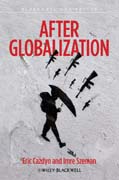
In lively and unflinching prose, Eric Cazdyn and Imre Szeman argue that contemporary thought about the world is disabled by a fatal flaw: the inability to think 'an after' to globalization. After establishing seven theses (on education, morality, history, future, capitalism, nation, and common sense) that challenge the false promises that sustain this time-limit, After Globalization examines four popular thinkers (Thomas Friedman, Richard Florida, Paul Krugman and Naomi Klein) and how their work is dulled by these promises. Cazdyn and Szeman then speak to students from around the globe who are both unconvinced and uninterested in these promises and who understand the world very differently than the way it is popularly represented. After Globalization argues that a truecapacity to think an after to globalization is the very beginning of politicstoday. INDICE: Acknowledgments. A Precis: The Argument. Part I: The Afterlife of Globalization. a. Nothing Can Save Us. b. From Globalization to Anti-Americanism. c. From Anti-Americanism Back to Globalization. d. 'I face the World as itis': On Obama. e. Of and After: Two Narratives of the Global. f. Seven Thesesafter Globalization. g. Somethings Missing. Part II: The Limits of Liberalism. a. After Globalization, or, Liberalism after Neoliberalism. b. Neoliberals Dressed in Black: Richard Florida. c. The Anecdotal American: Thomas Friedman. d. Confidence Game: Paul Krugman. e. The Non-Shock Doctrine: Naomi Klein. f. The Limits of Hollywood: Michael Clayton. Part III: The Global Generation. a. Next Generation. b. From Anti-Americanism to Globalization. c. A Map of the World. d. Biogeographies. e. Can't Get There from Here. Conclusion: 'Oh, Don't Ask Why!' Index.
- ISBN: 978-1-4051-7794-8
- Editorial: Wiley-Blackwell
- Encuadernacion: Cartoné
- Páginas: 264
- Fecha Publicación: 08/04/2011
- Nº Volúmenes: 1
- Idioma: Inglés
